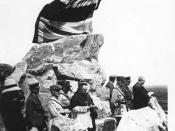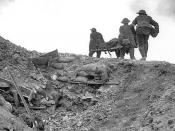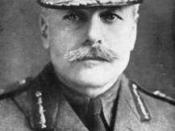This battle is known as the bloodiest battle because over 300,000 men died, with wounded and killed combined the casualties were over 1 million. This battle was fought between the British and German armies. Casualties on the first day were already the worst in the history of the British army. This battle took place from July 1st 1916 to November 18th 1919. There was no clear winner in this battle. Both armies were very badly hurt and neither of them returned to full strength after loosing so many people.
Cost of the Battle:
Near the end of the war the British had only advanced about 6 miles from here front line. They lost about 96,000 at that point and the French lost another 51,000. WE don't know exactly how many Germanys died but the estimates range from 100,000 to 160,000.
The effects of this battle badly affected both armies.
Even the survivors lost most of there enthusiasm after loosing so many soldiers. Before the Somme battle the British army had to switch from all volunteers to all draftees. The British army learned a lot of this battle, like there tactics got a lot better, supply arrangements and administrations behind the lines became more efficient. But overall the Germans remained a more powerful fighting force. During this battle there allies were trying to make supplies, because of the fact that the Germans were loosing so many trying to fight. Commandeer Ludendorff thought if this kept up the war would become a military struggle and Germany would end up loosing.
The planning:
Planning for this battle began in December 1915. Britain's new commander in chief, general sir Douglas Haig wanted to attack in Flanders in the north. General Joffre suggested that that the British army attack that the Somme river.
In February the Germans forced a change in the original plans by attacking the French at Verdun. The Somme area was not great for offense. This was a great place for the Germans to defend because they controlled the high ground. But the British still wanted to attack. There was some fighting that took place from June 24th to July 1st.
That morning the fire stopped and the British armies walked out from there lines thinking it was over when the stepped out the Germans opened fire and the British lost 60,000.
Renewing the attack:
British generals didn't understand how bad the damage was. The same evening of July 1st the British general ordered a new attack the next day. Attacks on the Somme from would continue till November 1916.
Even if the generals would have new how dad the damage was they still would have fought. The British were hoping to break through the German lines. And even if they didn't' they wanted to put more punishment on the German army. The attacks on the Somme helped the defense of Verdun. The Germans moved there artillery from Verdun to Somme. Soon after that the German chief of staff called off all German attacks on Verdun.
A wasted surprise:
One day about 35 British tanks rolled towards the German lines hoping to get some ground of the Germans. A couple of the German troop's gat a little panicked and the British were able to take some ground. But later in the day the German artillery ripped apart the British tanks and they were sent running back tot here front lines. A lot of the commanders say this was a wasted surprise and that Haig made a huge mistake but sending them out now. They say Haig should have waited longer till we had more tanks then the British wouldn't have got pushed back out and they would have had a better chance at winning.


